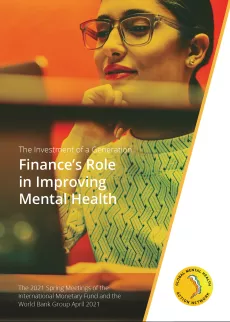Finance's role in improving mental health
The Global Mental Health Action Network
Highlights
Even prior to the COVID-19 pandemic, the world was not equipped to respond to the mental health needs of populations around the world. Poor mental health costs the world economy US$1 trillion a year due to reduced economic productivity and direct cost of care — more than cancer, diabetes, and respiratory diseases combined — and mental health and substance use conditions are the global leading cause of years lived with disability (YLDs).
These are losses of human capital that no country can afford. Now, COVID-19 is exacerbating this situation to an extreme degree — WHO had already documented in October 2020 that critical mental health services had been disrupted or fully halted in 93% of countries worldwide, at the same time demand and need for such services was growing rapidly.
April’s gathering at the IMF and World Bank Spring Meetings of leaders across the world is a critical moment. Attendees — specifically national finance ministers — have the capacity to systemically and sustainably ameliorate the global mental health situation through strategic cross-sectoral investment.



